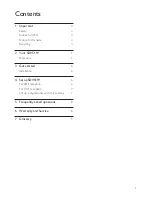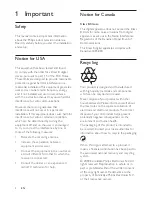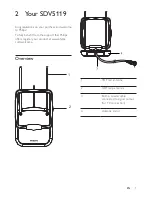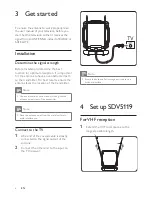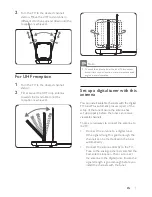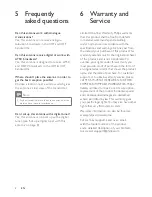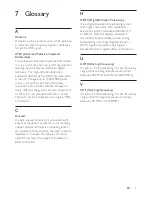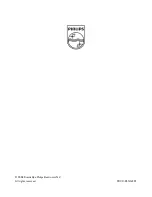
4
Notice for Canada
Class B Clause
This digital apparatus does not exceed the Class
B limits for radio noise emissions from digital
apparatus as set out in the Radio Interference
Regulations of the Canadian Department of
Communications.
This Class B digital apparatus complies with
Canadian ICES-003.
Recycling
Your product is designed and manufactured
with high quality materials and components,
which can be recycled and reused.
Never dispose of your product with other
household waste. Please inform yourself about
the local rules on the separate collection of
electrical and electronic products. The correct
disposal of your old product helps prevent
potentially negative consequences on the
environment and human health.
The packaging of this product is intended to
be recycled. Contact your local authorities for
information about how to recycle the packaging.
When this logo is attached to a product, it
means a financial contribution has been paid to
the associated national recovery and recycling
system.
© 2008 Koninklijke Philips Electronics N.V. All
rights reserved. Reproduction in whole or in
part is prohibited without the written consent
of the copyright owner. Trademarks are the
property of Koninklijke Philips Electronics N.V.
or their respective owners.
1 Important
Safety
This manual contains important information
about the Philips indoor television antenna.
Read it carefully before you start the installation
and setup.
Notice for USA
This equipment has been tested and found
to comply with the limits for a Class B digital
device, pursuant to part 15 of the FCC Rules.
These limits are designed to provide reasonable
protection against harmful interference in a
residential installation. This equipment generates,
uses and can radiate radio frequency energy
and, if not installed and used in accordance
with the instruction manual, may cause harmful
interference to radio communications.
However, there is no guarantee that
interference will not occur in a particular
installation. If this equipment does cause harmful
interference to radio or television reception,
which can be determined by turning the
equipment off and on, the user is encouraged
to try to correct the interference by one or
more of the following measures:
Relocate the receiving antenna.
•
Increase the separation between
•
equipment and receiver.
Connect the equipment into an outlet on
•
a circuit different from that to which the
receiver is connected.
Consult the dealer or an experienced
•
radio/TV technician for help.
EN



